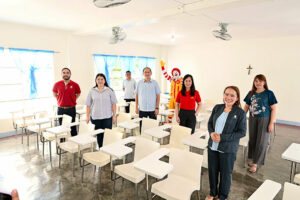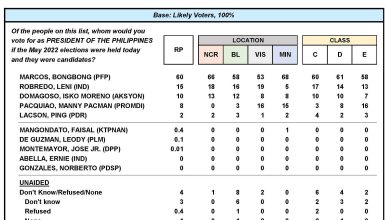Making the old new again

WHAT happens to the old furniture when a restaurant gets refurbished, as all have to do to keep up with the times? Sometimes the old equipment is sold, sometimes it is tossed into the dump. And this time, it is transformed into classroom chairs.
By the count of Adi Hernandez, McDonald’s Philippines AVP for Corporate Relations, the fast-food giant has about 700 stores in the Philippines. “Every year, we open at least 50,” she said. McDonald’s branches are also constantly renovated and opened, and “We will always have equipment that will be unused, and therefore can be repurposed,” Ms. Hernandez added.
On Sept. 8, guests were invited to see these old chairs from McDonald’s restaurants made new as desks at Marikina’s San Roque Elementary School in a project called ReClassified.
McDonald’s partnered with social enterprise Junk Not to design and fabricate the desks. Junk Not, founded by
Dr. Willie Garcia who is also its principal designer, upcycles plastic materials into new furnishings. Junk Not used the old restaurant furniture to make chairs and tables, including an arm desk for schools. The transformation from worn out restaurant furniture to school desks included everything from prototyping to production of the final products, which they assure come up to global standards.
“I’m sure you’ve sat on these chairs,” said Ms. Hernandez during the project launch at the school’s basketball court, referring to their former lives. “It’s all about strengthening it and adding the table. Definitely it has all the safety requirements, as we prioritize also in the stores,” she said.
To date, the partnership has created 200 desks, with 100 already installed in San Roque Elementary School, and 100 in another Marikina location. Ms. Hernandez said that they have worked closely with the Marikina local government on other projects, such as the Ronald McDonald House Charities. And, “To be very honest, they raised their hand, and they were interested,” in this seats-for-schools project.
In a statement, Marikina mayor Marcelino “Marcy” Teodoro (a San Roque Elementary graduate, according to a release), said, “We, in government, are at the helm of ensuring quality education for all, but we cannot do it alone. Sabi nga (they say), education is everyone’s responsibility. Creative solutions through strategic partnerships with various sectors amplify positive outcomes. No matter the scale, collaborations such as this ReClassified project contribute to our shared goals for Filipino learners. Kaya’t salamat (and so thanks) McDonald’s for choosing Marikina and my alma mater, San Roque Elementary School, as your first beneficiary.”
Other corporate social responsibility (CSR) projects that the fast-food giant has had include McClassroom, where they used the party spaces (vacant during the pandemic) in restaurants as classrooms for needy schools. Now that parties are back in, the party spaces are still used as classrooms, but only in the evenings. They’ve also just concluded a partnership with Brigada Eskwela to help prepare public schools for the opening of the school year, giving cleaning materials and providing manpower through their employees. “It’s really about supporting education and the youth,” McDonald’s Ms. Hernandez said.
McDonald’s concentration on the educational sector for their corporate social responsibility projects is a choice of its employees. Ms. Hernandez said when asked, “We checked from within our crew.” By her count, they have 60,000 employees nationwide — “All of them directly hired; no contractual (employees) at McDonald’s” — a large chunk of whom are working students.
“We believe that there’s an opportunity for us to help these working students. They’re able to go to school while having work. We provide them with flexible working hours,” she said. According to her, their enrolled employees can show their class schedules to their managers, and shifts can be adjusted to their school schedules.
“I don’t even want to call it CSR. Corporate social responsibility has always been associated with charity or one-off donations. It should be part of every business model, and it should really have value to a business life cycle,” she said. — JLG




